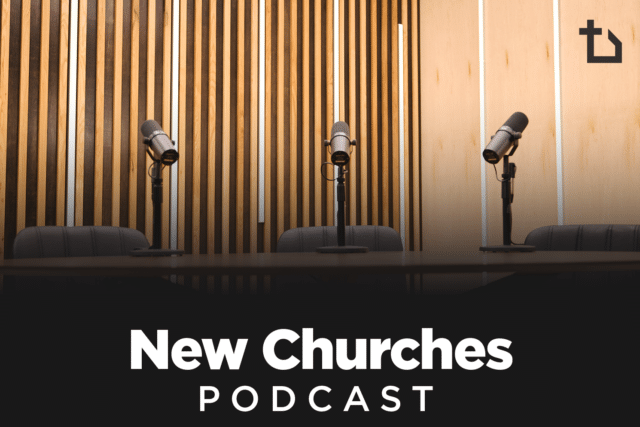Article
3 Reasons Why Your New Church Needs Deacons
When I think of ecclesiology, especially as it relates to leadership, three roles must be considered: elders, deacons, and members. I believe the most neglected of the three is the role of deacon.

Christian leadership author and speaker John Maxwell has famously said, “Everything rises and falls on leadership.” The sovereignty of God assumed, and making ample room for hyperbole, I mostly agree. This is true especially in the earliest days of a church plant when everything seems so vulnerable and so volatile; it is a miracle that any plants “make it” at all. We should take comfort in Jesus’ words in Matthew 16:18, “I will build my church, and the gates of hell shall not prevail against it.” The image that Jesus gives us here of His church is a strong, victorious, offensive force storming the gates of hell.
So, why does the local church often seem quite the opposite?
I contend that the foundational problem is that we aren’t structured for it. Let me reframe Maxwell’s maxim: Everything rises and falls on ecclesiology. And there is no more critical time to set a strong foundation for the church than in its first days. Every leadership decision we make in the earliest days will have ripple effects and consequences for years to come.
When I think of ecclesiology, especially as it relates to leadership, three roles must be considered: elders, deacons, and members. Much ink has been spilled on eldership and membership; both roles are utterly crucial to the health of a church plant. But after fifteen years of leading a church-planting church, thirteen of those helping other churches plant thriving churches, I believe the most neglected of the three is the role of deacon. Here are three reasons why:
Many Confuse Deacons with Elders/Pastors/Overseers
I’m sure there are a number of different reasons as to why, but the nomenclature that many new churches use for their leadership has drifted away from biblical terminology. Maybe it’s a “chicken or the egg scenario” but just as the nomenclature has shifted, so have many of the qualifications, definitions, and role assignments. There are even newly resurrected debates over definitions of offices that have been firmly established for decades among denominations and centuries within confessions. What changed? Language.
Just as many churches have moved to take denominational affiliation out of their public-facing names, language for leaders has changed, too. The interchangeable titles of “elder” and “overseer” have nearly all been distilled down to the ever-popular “pastor.” More so, anyone leading an area of ministry at a church might find themselves being called “pastor” whether they meet the biblical qualification of one or not. While much more could be said here, my focus is this: this has done a huge disservice to the role of deacon in the local church.
When Paul wrote to the church in Philippi, he wrote, “To all the saints in Christ Jesus who are at Philippi, with the elders and deacons” (Philippians 1:1). Paul distinguished the offices and roles (but notice: members, elders, and deacons in one place). When Paul wrote his first letter to Timothy, he separated the roles, giving us both qualifications for elders and qualifications for deacons (1 Timothy 3:1–13). The New Testament pattern seems to indicate that elders were appointed first, then deacons (Acts 14:23; Titus 1:5). Either way, we see from these texts and so many more that not only are their titles different, but so are their functions.
In his Theology of Deacons, Bob Thune states, “The main task of elders is theological oversight and pastoral care; the main task of deacons is practical ministry.” There are two wings of the local church leadership airplane. Without them both, the plane is in danger of crashing. Or in the case of a church plant, it is in danger of never getting off the ground, at least not very far.
Many Shift the Role and Office of Deacons
Paired with a strong eldership, a biblically designed team of deacons can be a powerful force in a local church. While the elders focus on theology, prayer, and shepherding, deacons focus on serving practical needs and leading practical systems to translate theology into community and mission. As a biblical office, deacons must meet an equally high standard of qualification (1 Timothy 3:8–13). And lending to their practical nature yet also the necessity of their role, deacons should be tested first to make sure they are ready to be lead servants in the church.
Unfortunately, deacons are conspicuously absent from many churches’ org charts. Perhaps to help the people feel special, practical ministry leaders are also called pastors, leaving the church and leaders in those positions with fuzziness in understanding what the role’s focus should be. On the other hand, deacon-type roles can be minimized as roles for interns or stepping stones for those developing toward “real ministry” of eldership. Maybe the most confusing is the not-so-subtle shift of deacons from the practical ministry leadership role to pseudo-lay elders. They aren’t quite pastors; they hold pastors accountable, and they make major decisions, but they aren’t leading out in practical ministry. These shifts leave the church with a massive gap in God’s biblical design.
Many Use Only Part of the New Testament to Design a Deacon Profile
When a conversation about deacons starts, a reference to Acts 6 is surely not very far behind. Though not a direct reference to the office of deacons, it is commonly agreed that Acts 6 serves as a prototype for an elders-and-deacons relationship within the local New Testament church that launches and grows out of what God does in those earliest days in Jerusalem.
But if we stop at Acts 6, we will miss so much that the New Testament has to offer as the early church grows, expands, and even establishes beyond its apostolic beginnings. You see, the word for deacon, in the original language, has a broad New Testament semantic range. At its basic definition, it means servant. But more than a generic reference to servanthood, which is to be true of every Christian, it also takes on the meaning of ministry. Paul uses it to challenge his protégé in 1 Timothy 4:6 as someone fulfilling his ministry in service to Christ. Finally, as we see in Philippians 1 and 1 Timothy 3, it is an office in the established New Testament church.
Further still, there are qualifications that extend beyond what is described for the circumstances of Acts 6 and a narrowing of the office that can happen if we don’t include the rest of the New Testament, specifically 1 Timothy 3:11 and Romans 16:1, which both show the office is not like the office of elder, which is reserved only for qualified men.
So how do we avoid these Scriptural miscues and give our new churches the gift of deacons?
- Determine what practical areas of ministry the church needs to address to better fulfill its mission and vision. Some of the necessary systems in a church plant include: children’s programs, student ministry, greeting and assimilation processes, sound and A/V, set-up and tear-down, finance and offering, and hospitality.
- As a part of your membership process (core team or formal membership), include a spiritual gift inventory to determine skills, gifts, passions, and past experience.
- Allow people to “try out” ministry leadership on a shared or rotational basis. As they do, continue to monitor their progress and spiritual maturity, looking specifically for the qualification found in 1 Timothy 3 for deacons.
- As they demonstrate qualifications in character and competency, invite them into a formal testing process. I like using the term “ministry team leader” for this season.
- Once tested and found faithful, install the ministry team leader to the office of deacon during a corporate worship gathering, sharing the biblical vision and blessing of deacons. Use this opportunity to celebrate that Christ is building His church and calling others to model this person’s example in life and service.




